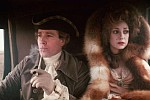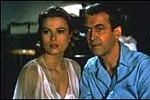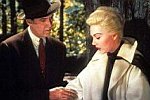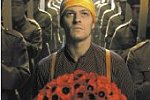 Shadows off the beaten path
Shadows off the beaten pathVERTIGO | WAR REQUIEM
< < R E V I V A L S > >
last update 29.Jan.09
See also: SHADOWS FILM FESTIVAL
 R E V I E W B Y R I C H C L I N E
R E V I E W B Y R I C H C L I N E MUST
MUST  SEE
SEE
with Ryan O'Neal, Marisa Berenson, Patrick Magee, Hardy Kruger, Steven Berkoff, Gay Hamilton, Marie Kean, Diana Koerner, Murray Melvin, Leon Vitali, Leonard Rossiter, Andre Morell
narr Michael Hordern
 release UK/US 18.Dec.75
release UK/US 18.Dec.75reissue UK 30.Jan.09
75/UK Warners 3h07
BERLIN FILM FEST
 Based on the Thackeray novel, Kubrick's languid, exquisite period romp not only still looks magnificent on the big screen, but the story has an almost uncanny relevance. And the style of filmmaking and performances feels fresh even after nearly 35 years.
Based on the Thackeray novel, Kubrick's languid, exquisite period romp not only still looks magnificent on the big screen, but the story has an almost uncanny relevance. And the style of filmmaking and performances feels fresh even after nearly 35 years.
Redmond Barry (O'Neal) is a hapless young 18th century Irishman whose life starts spiralling out of control even before he's born. After an obsessive crush on his cousin (Hamilton) goes wrong, he takes to the road, fighting for the British and the Prussians before teaming up with a gambler (Magee) to fleece as many people as possible. Eventually he falls for and marries Lady Lyndon (Berenson), whose young son grows up (Vitali) and never accepts him as father. Meanwhile, Barry's wanton ways continue to get him in trouble.
Barry is a wonderful movie character: an unapologetic slacker guided by his petulance. And O'Neal is perfect in the role, full of naive emotion and brittle rage. His interaction with all of the people he encounters is vivid and textured, with telling details and fantastic chemistry that swerves from suspicion to passion, and often to revulsion. He even somehow manages to make the elaborate costumes look like everyday garb, as do all of the actors.
And perhaps this is why the film works so well: despite the elaborate production design, it feels utterly contemporary. Even Hordern's sardonic narration feels right at home, as does the sumptuous underscore of classical pieces. Kubrick's stately, slow-moving style really brings out the mood and emotion, as well as a lot of outrageous humour. The battle scenes and physical brawls are astonishingly realistic, and each dual has a heart-stopping sense of desperation that completely removes any noble sense of "satisfaction".
Yes, at just over three hours, this is a long film. But you wouldn't skip a single moment. The story arc is so pure, plotting Barry's rise and fall, that each beautifully lingering scene feels essential. And on a big screen, each shot is a feast for the eyes. Not only the sun-drenched landscapes and impeccably designed sets, but the actors themselves look amazing. At the centre, this is a fascinating story of a young man who has no centre. He feels like a direct ancestor of Forrest Gump and Benjamin Button. But this film is a lot more fun--and more insightful--than theirs are.
27.Jan.09
 R E V I E W B Y R I C H C L I N E
R E V I E W B Y R I C H C L I N E MUST
MUST  SEE
SEE
scr John Michael Hayes
with James Stewart, Grace Kelly, Wendell Corey, Thelma Ritter, Raymond Burr, Judith Evelyn, Ross Bagdasarian, Georgine Darcy, Rand Harper, Sara Berner, Frank Cady, Jesslyn Fax
 premiere US 1.Aug.54
premiere US 1.Aug.54restored US 21.Jan.00
UK 4.Feb.00 54/US Paramount 1h52

 Easily my favourite Hitchcock film, I was lucky enough to see it for the first time on the big screen (when it was re-released 1983 after nearly 30 years of legal wrangling). In the cinema, the film is astonishingly claustrophobic, as Hitchcock used point of view to keep us squirming in our seats.
Easily my favourite Hitchcock film, I was lucky enough to see it for the first time on the big screen (when it was re-released 1983 after nearly 30 years of legal wrangling). In the cinema, the film is astonishingly claustrophobic, as Hitchcock used point of view to keep us squirming in our seats.
Jeff (Stewart) is an adventurous photographer who's confined to his New York flat by a shattered leg. Bored out of his mind, he watches his neighbours through their windows, inventing stories for their lives: a lonely spinster (Evelyn), a pneumatic dancer (Darcy), a songwriter (Bagdasarian, of Chipmunks fame), a nagged newlywed (Harper) and, most interesting of all, a man (Burr) who seems to have murdered and chopped up his wife. But both Jeff's girlfriend Lisa (Kelly) and his detective friend (Corey) think he's jumping to conclusions. Until things start looking increasingly suspicious.
The film is a marvellous balancing act, as Hitchcock turns us into voyeurs who are fascinated in the lives of people we don't know. And by keeping the perspective firmly locked on Jeff, we also become helpless observers of something potentially life-shattering. The scene when Lisa goes to investigate is one of the host tense moments in cinema history; we can feel our hearts in out throats, and we can see that Jeff feels just as terrified. And it gets even more intense from there.
The casting is also extremely clever, with Stewart's scruffy, careless charm contrasting hugely opposite Kelly's outrageous glamour. The innuendo in their dialog is absolutely hilarious--and remarkably fresh even after all these years. And Kelly has never looked more beautiful than she does in this film. Is it possible to watch Rear Window without falling in love with her? I doubt it.
This is Hitchcock at the peak of his considerable powers, gleefully manipulating the audience to get us right where he wants us, and packing the screen with inventive touches (such as the way Jeff uses his camera's flashbulb as a signal and then a defensive weapon). It's a virtually perfect film that certainly didn't need to be remade (by Christopher Reeve in 1998 and by DJ Caruso as Disturbia in 2007).
revisited 14.Sep.08
 R E V I E W B Y R I C H C L I N E
R E V I E W B Y R I C H C L I N E MUST
MUST  SEE
SEE
scr Alec Coppel, Samuel Taylor
with James Stewart, Kim Novak, Barbara Bel Geddes, Tom Helmore, Henry Jones, Raymond Bailey, Ellen Corby, Konstantin Shayne, Lee Patrick, Paul Bryar, Jean Corbett, Joanne Genthon
 premiere US 9.May.58
premiere US 9.May.58restored US 4.Oct.96,
UK 25.Apr.97
58/US Paramount 2h09

 This was one of five Hitchcock movies that I first saw on the big screen (when the films were finally released in 1983 after their legal lock-down). And after hearing about it for so long, it was rather shocking to see what a dark and twisted story it is.
This was one of five Hitchcock movies that I first saw on the big screen (when the films were finally released in 1983 after their legal lock-down). And after hearing about it for so long, it was rather shocking to see what a dark and twisted story it is.
After his fear of heights ruined his career as a detective, Scottie (Stewart) is hired by a friend Gavin (Helmore) to keep an eye on his wife Madeleine (Novak). While following her as she wanders around San Francisco, Scottie discovers that she believes she's the reincarnation of a mentally unstable historical figure. And as Scottie completely falls for her, he's horrified when she tries to commit suicide, eventually succeeding. Some time later, Scottie meets Judy (also Novak), a darker, rougher version of Madeleine who he immediately tries to recreate in Madeleine's image.
This is an extremely creepy story of obsession on so many levels that is really does your head in. Everyone in the film has some sort of life-paralysing secret passion that keeps them from really living. And it all boils over in Scottie's literally stalker-like relationships with both Madeleine and Judy. All of this comes together in a dizzying scene in Judy's hotel room, when Scottie finally achieves his goal of recreating Madeleine, a woman who was a fantasy to begin with.
This is outrageously heavy stuff for a thriller, and Hitchcock keeps squeezing these characters (and the audience) right to the film's breathless climax. In many ways, the film is the ultimate expression of the director's own obsessions: manipulating (usually blonde) actresses into a place of painfully guilt-ridden vulnerability.
Even so, Judy is perhaps the strongest female in any Hitchcock film, a complex woman who is a victim of both her own past and Scottie's obsessive desires. In the end, she's the one we identify with--her internal pain is simply unbearable. In some ways it's actually too much for us to bear, especially as the film stretches over two hours. But it's one of the most provocative, haunting, unforgettable examinations of the human soul ever put on film.
revisited 27.Sep.08
 R E V I E W B Y R I C H C L I N E
R E V I E W B Y R I C H C L I N E
with Nathaniel Parker, Tilda Swinton, Laurence Olivier, Sean Bean, Patricia Hayes, Rohan McCullough, Nigel Terry, Owen Teale, Alex Jennings, Antony Gabriel, David Meyer, Thomas Kett
 release UK 6.Jan.89,
release UK 6.Jan.89, US 26.Jan.90
89/UK BBC 1h32
 Released on DVD for the first time, in a pristinely remastered 20th anniversary edition, Jarman's powerful film artfully adapts Benjamin Britten's War Requiem, which features the poetry of Wilfred Owen. There's no spoken dialog, but the elegance of the music, poetry, acting and filmmaking combine into something truly sublime.
Released on DVD for the first time, in a pristinely remastered 20th anniversary edition, Jarman's powerful film artfully adapts Benjamin Britten's War Requiem, which features the poetry of Wilfred Owen. There's no spoken dialog, but the elegance of the music, poetry, acting and filmmaking combine into something truly sublime.
While an old soldier (Olivier) is haunted by his experiences in the war, a nurse (Swinton) can't escape the horror of so many dead young men. Through her memory and imagination, we see young soldiers training for battle, digging trenches in grim conditions, daily life on the front and the personal horror of warfare. We also some dramatic re-enactments, as well as moments of levity, such as a colourful stage show on the hospital ward. Eventually the film expands to look at war in general, with footage of WWII and Vietnam.
Made with a real sense of passion, the performances are devastatingly emotional, especially as accompanied by Britten's evocative music and Owen's moving words. One extended take of Swinton's anguish is breathtaking. Essentially this is a silent film, but the choral score and pointed imagery tell us everything. Sometimes the choir is superimposed in black and white over archival footage. Some clips are animated or provocatively coloured, such as an effectively hellish firebombing sequence. Other scenes are shot in sharp detail.
It's somewhat stagy and, except in archive footage, the violence is heavily dramatised. For example, a German soldier (Bean) starts playfully throwing snowballs at an Englishman, but their happy game turns into tragedy. There's also a surreal operatic re-enactment of the Abraham-Isaac story in a bombed out building, in which everyone is coated in heavy stage make-up, including old men watching from the boxes (ie, window frames).
And the biblical echoes continue to a Christ-like hero soldier wearing a crown of barbed wire. While the church altar becomes a dead soldier's bed and then a tomb. But the focus through the music is on the internal emotional journey of these soldiers. We really feel their anguish as well as their camaraderie. And then there's the horrible waste of young lives, deliberately sacrificed by the toffs back home. It's not an easy film, but it really is a thing of beauty.
31.Oct.08


See also: SHADOWS FILM FESTIVAL
© 2009 by Rich Cline, Shadows
on the Wall